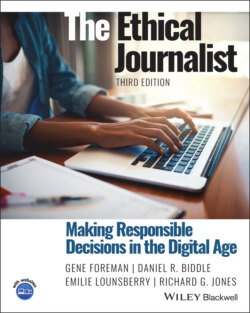Читать книгу The Ethical Journalist - Gene Foreman - Страница 31
Being Ethical Requires Action
ОглавлениеEthics is a set of moral principles, a code – often unwritten – that guides a person’s conduct. But more than that, as Gerst and Cruickshank demonstrated, ethics requires action.
“There are two aspects to ethics,” the ethicist Michael Josephson says. “The first involves the ability to discern right from wrong, good from evil, and propriety from impropriety. The second involves the commitment to do what is right, good, and proper.” As a practical matter, Josephson says, “ethics is about how we meet the challenge of doing the right thing when that will cost more than we want to pay.” 3 Or, in the words of Keith Woods, former dean of faculty of the Poynter Institute, “ethics is the pursuit of right when wrong is a strong possibility.” 4
Gerst and Cruickshank were practicing applied ethics, the branch of moral philosophy that deals with making decisions about concrete cases in a profession or occupation. 5 That is what this text is about. Your study of applied ethics in journalism is intended to help you solve the challenges you may face in your career. To do so, you need to draw on your own sense of right and wrong, enhanced by an understanding of ethical theory and a systematic way of making decisions. The idea is to put ethics into action.
Although some scholars see a fine distinction between ethics and morals, the terms are used interchangeably in this text. The Cambridge Dictionary of Philosophy defines ethics as “the philosophical study of morality” and says ethics “is commonly used interchangeably with morality” to mean the subject matter of such a philosophical study. 6
